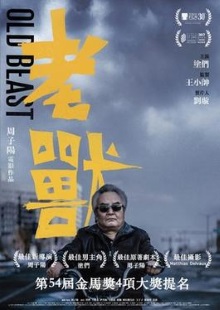
This one is another Chinese film that has garnered a fair share of plaudits and its the debut film of its director Zhou Ziyang. Interestingly, it is set in the city of Ordos in Inner Mongolia, the same city that some years ago was paraded about in the Western press for being a prime example of China’s overbuilding spree, resulting in empty streets and buildings. I’ve read however that since that enough people have since moved to make it, if not exactly a thriving city, at least a real one.
Lao Yang, getting along in years but still hale and hearty, appears to be a local fixture of the city, getting around on his small motorcycle. His children despair at his habits of smoking, gambling and frequenting prostitutes even as his bedridden wife lies unattended at home but are powerless. One day he meets an old friend from the countryside who has with him a sick camel. After spending the night at a shady massage parlor he promises to take care of the camel for a few days. However he immediately takes the camel to a butcher to sell the meat, then uses the money to buy presents for his mistress. Meanwhile after trying and failing to contact him, his wife at home has fallen unconscious on the floor. Their children discover her, bring her to the hospital and after much difficulty raise the money to pay for her surgery. At this point, it’s easy to predict that Lao Yang ends up stealing the money for his own ends as well.
Given how hard the film tries to paint Lao Yang as the villain in its first half, it is similarly easy to guess that the director would then try to show in the second half that not all is as it appears and that he is still a man with redeeming qualities. It’s an angle that could work for some films but is a little too naked and obvious here to be effective. There’s also the matter of Lao Yang being a little too vile to garner enough sympathy. Even if the matter of the camel is resolved in a way that makes his friend happy, it is clear that he never planned that far ahead and it just happened to play out right. I also dislike the unrealistic lengths that they go to in order to create a situation where he is in a position to steal the money his children raise, which is both implausible and lets you see the plot far in advance.
Even so, I have to admit that the character of Lao Yang is both vivid and readily believable. It’s the perfect depiction of the Chinese patriarch, headstrong, believing himself to be beyond question or reproach by his children and inclined towards acting magnanimously even if he doesn’t actually have the money. On the flip side, he really does care for his family even if his pride doesn’t allow him to actually say so and he remembers and honors old debts. A great scene which nicely captures how stupidly prideful he is can be seen in the bus when a passenger berates him for not using the designated exit and he elects to jump out of the window instead, showing how he would rather hurt and inconvenience himself rather than appear to bow to instructions from another person. The actor Tu Men who plays him does a great job as well so this should be a better film than it is. It’s just that the film tries too hard to create a twist from a negative portrayal of the character to a more positive one instead of showing him to be a complex person right from the beginning.
Overall I’d judge this as a film that is less than the sum of its parts. Many of its individual scenes are quite good but taken together they don’t quite achieve what the director manifestly means to do. In particular, there is a sense that the audience is meant to forgive him for his flaws as he means well deep inside but that isn’t validated by what we see on screen as he never has to express any remorse over his actions or change his ways. This might well be a case of me with my more Western-oriented values being offended by a more Asian take on family values. In any case, I find it difficult to actually like this film.